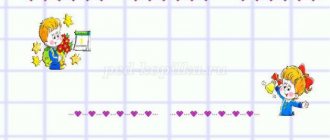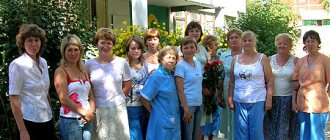Summary of the parent meeting in the junior group “Let's get to know each other!”
Summary of the parent meeting in the junior group
"Let's get acquainted!"
Target:
expanding contact between teachers and parents; modeling prospects for the new academic year; improving the pedagogical culture of parents.
Tasks:
introduce parents to the kindergarten’s goals for the new school year and the group’s plans for the near future;
update the personal data of the families of the pupils; teach parents to observe their child, study him, see successes and failures, and try to help him develop. Determine available methods and forms of working with parents. Progress of the meeting.
1. At the entrance to the group, parents are asked to fill out the newspaper “We want our children to become...”.
Everyone is given a booklet “Rules for Parents”.
Presentation
“Kindergarten is our second family.”
Teacher 1
: Dear parents and grandparents of our children! We are very glad to see you at the first parent meeting, because we understand: without an alliance with children, without your support and help, raising them and creating a cozy and joyful environment for them in kindergarten is an impossible task. What should our union be like, what can we, adults, do for children to make their life in the group joyful and interesting? This will be discussed specifically at this meeting.
Teacher 2
: But first, it’s not for nothing that our meeting is called “Let’s get to know each other!” Let’s get to know each other better.
Training exercise “Glomerulus”.
The teacher holds the ball in his hands and invites the parents to tell them a little about themselves, what they expect from the kindergarten, and what wishes they would like to voice to the teachers.
First, the teachers talk about themselves, wrap a thread around their finger and pass it around. As a result, when the ball returns to the teacher, it becomes a vicious circle. Educator1
: Dear parents. Look, you and I are closely connected and solve the same problems. We are like a big family, we must act together. After all, we must not forget that the parent is the main educator, and the kindergarten was created to help parents.
We have met and now, with a good mood, we move on to serious issues.
It is very important that you, loving parents, be close to your children. We have to rejoice and overcome difficulties together, grow up and learn. Learning means teaching ourselves. As a rule, their mothers, fathers, and grandparents study together with the children.
Teacher 1
: Look at our wonderful
newspaper
. What do parents expect from their children?
So that they become strong, smart, honest, healthy, inquisitive, etc.
Your dreams will come true if we work closely with you. We work according to the basic general educational program of preschool education, which is aimed at strengthening the health of children and the comprehensive development of the growing personality. We also face annual tasks: 1) the formation of components of the speech system of preschool children through the development of fine motor skills of the hands;
2) development of social and communicative competence of pupils through the organization of various types and forms of gaming activities.
Teacher 2
: The program provides solutions to problems for the second younger group, which you can find in the instructions for parents.
Working with booklets. Conversation about rules for parents
Our group rules.
Tell me, can you make a clap with one palm? Need a second hand. The clap is the result of the action of two palms. A teacher is only one palm. And no matter how strong, creative and wise she is, without a second palm (and it is in your face, dear parents), the teacher is powerless. From this we can derive the first rule:
- Only together, all together, we will overcome all difficulties in raising children.
Take everything by flower and color them
. Now compare your flower with the flowers of your neighbors. All the flowers were the same in shape and size. Tell me, after you have painted a flower, can you find two completely identical flowers? We, adults, under the same conditions, do everything differently. Hence our second rule:
- Never compare your child with another!
We will compare, but these will only be the results of the same child yesterday, today and tomorrow. This is called monitoring. We will do this in order to know how and what to do with it tomorrow. We will do this in order to grow every day. And not only in knowledge, but also in actions.
You and I will walk together and side by side for 4 years. We have our own traditions.
— One
Once a month, parents organize entertainment for children: this could be a theatricalization of a fairy tale, or an invitation to visit fairy-tale characters - animators.
— In January
This month we are in a place
where it is customary to organize a festive performance for children.
2.
I would like to start my speech with the words of a famous teacher
A.S. Makarenko “Our children are our old age. Proper upbringing is a happy old age, bad upbringing is our future grief, our tears, it’s our guilt before other people, before antiquity.”
Young age is an important period in the development of a preschooler, which is characterized by high intensity of physical and mental development. At this time, the child transitions to new relationships with adults, peers, and the objective world.
Psychologists pay attention to the “three-year crisis”
when a younger preschooler, who until recently was so flexible, begins to show intolerance to the guardianship of an adult, the desire to insist on his demands, and persistence in achieving his goals.
This indicates that the previous type of relationship between an adult and a child should be changed in the direction of providing the preschooler with greater independence.
If a new relationship with a child does not develop, his initiative is not encouraged, his independence is constantly limited, then whims, stubbornness, obstinacy arise (this does not happen in contact with peers)
Independence
- a valuable quality that a person needs in life.
It is necessary to educate him from early childhood. By nature, children are active; very often they strive to perform various actions independently. And it is important for us, adults, to support them in this.
Often, each of us, in response to an offer to do something for a child or help him with something, had to hear “I myself!”
At this age, the child realizes himself as a separate person, with his own desires and characteristics. The child practically becomes independent: he can perform many actions without the help of an adult, and learns self-service skills.
Now let's look at the situation.
Situation for analysis
Three-year-old Ilyusha diligently puts on tights. Difficult task! Finally, after much effort, the tights are almost on, but... inside out. The baby, of course, doesn’t notice this and continues to pull them on. The mother stops, as she says, “this aimless fuss,” and with a quick movement, without hiding her irritation, tries to pull on the child’s tights. The baby screams:
- By yourself, by yourself, by yourself!
The mother says sternly:
- Sit quietly and don’t be capricious! You don’t know how, but you shout “yourself.”
Questions:
- Did mom do the right thing? And why?
- Do similar situations happen to you?
- How do you get out of them?
Often, for various reasons - due to lack of time, lack of confidence in the child’s strengths - we strive to do everything for him ourselves.
- But are we really helping the child?
- How do you think?
- Can a small child be independent?
It is important to note that in the children's expression “I myself”
the desire for independence is manifested.
Trying to do everything for a child, adults cause him great harm, deprive him of independence, undermine his faith in his own strength, teach him to rely on others, children can grow up passive and lazy.
Example:
The child tries to dress himself, but his mother does everything for him. He sighs heavily and says: “That’s what I wanted myself!”
Psychologists say: by the age of three, a child’s desire for independence and independence from an adult, both in actions and desires, sharply increases. He develops a strong desire to assert himself.
Under no circumstances should these aspirations be suppressed - this leads to complications in relationships.
child and adult.
The first of them is negativism,
that is, disobedience or unwillingness to follow the instructions of an adult, but the desire to do the opposite.
Then - stubbornness
, the child will insist on his own simply because he demanded it.
Obstinacy or self-will may also appear in the child’s behavior.
(the child wants to do everything himself, refusing the help of adults), such phenomena as
rebellion against others
(conflict with others, constantly quarrels, behaves aggressively).
Thus, suppression of children's independence can have a serious negative impact on the development of the child's personality.
- Have you encountered similar manifestations?
- How did you get out of such situations?
When developing independence skills in children, we often encounter that the child cannot or does not cope with the proposed task. How to act in such situations?
Situation for analysis.
Having learned to clean up after himself after eating, Gena began to push the chair, but his leg caught on the table leg. Gena did not make any effort, he abandoned the small but necessary effort and immediately abandoned his intention. When his mother reminded him that he needed to push his chair in, the boy said tearfully: “It just doesn’t work!”
What actions should adults take?
And now, dear parents, we offer you an algorithm
and rules for folding clothes in a closet. This algorithm will be in the corner for parents.
So, children strive for independence.
What can they do independently at a younger age?
Let's try together to determine a list of actions that our children can perform (discussion with parents):
- Wash your hands by rolling up your sleeves; wash your face without splashing water; use soap correctly; do not wet clothes; Dry yourself with a towel, hang it in the designated place without being reminded.
- Dress and undress in a certain sequence: take off clothes, fold them, hang them, turn them right side out; put on clothes, unfasten buttons, fasten them, tie shoelaces.
- Notice the mess in your clothes and fix it yourself or seek help from an adult.
- Use a handkerchief and toilet in a timely manner.
- Drink from a cup; eat, chewing food well, with your mouth closed.
- Use a spoon, fork, and napkin correctly.
- Place toys, books, and building materials in a specific place.
Of course, the child does not immediately acquire the necessary skills; he needs our help, creating the necessary conditions for the manifestation of independence, correctly guiding the actions of children and be sure to praise, praise for the slightest manifestation of independence.
Teacher 2
: There are many ways for educators and parents to communicate through folding screens, consultations, magazines, a library, and leaflets for parents. In the parental library you will find a large number of books, manuals and literature, after reading which you will learn what to do with your child at home, how to cope with whims and much more.
We live in the modern world, and for those who cannot imagine themselves without a computer, we have also prepared a surprise. On the website of the Scarlet Flower kindergarten we will post photographs about the life of our group, and you will also find consultations there. So, welcome.
Teacher 1
: Your desire to help us in raising and organizing an interesting life for children makes it possible to hope that no one will be left behind. The parent committee will help us a lot with this.
Selection of the parent committee.
In conclusion, I would like to say: “Children are happiness created by our work!”
and wish each other success in our difficult task.
Thank you for your attention!
Parent meeting
A parent meeting in kindergarten is the main form of joint work between the teacher and parents, at which decisions are discussed and made on the most important issues of the life of the class community and the upbringing of children in kindergarten and at home. Parent meetings in kindergarten need to be held in different ways, alternating different forms, using creative ideas.
Parent meetings in kindergarten play an important role in establishing interaction between the teacher and parents, as well as between the parents themselves. This is a unique form of feedback, an opportunity to discuss upcoming plans for teaching and raising children in kindergarten and talk about the individual characteristics of children’s development. Teachers also invite specialized specialists to parent meetings: speech therapists, psychologists, methodologists, doctors.
In the section of the site, parent meetings in kindergarten for different age groups contain many interesting meetings for teachers on various topics:
- Summary of the parent meeting in the senior group “The role of parents in the labor education of children”
- Parent meeting in kindergarten on the topic “Formation of hard work in preschoolers” in the middle group
- Parent meeting in the second junior group “Let’s get to know each other”
- Parents' meeting in kindergarten "Daddy's Holiday" in the younger group
- Parent meeting in the senior group “Education and development of effective communication skills with children”
- Parent meeting in kindergarten on the topic “Towards new knowledge in the new school year!”
- Summary of the parent meeting in the middle group on the topic “Do you know your child”
- Outline of the parent meeting in kindergarten in the preparatory group “Health-saving technologies in our kindergarten”
- Parent meeting in the middle group at the beginning of the school year
- Summary of the parent meeting in kindergarten “Results of educational work”
- Parent meeting in kindergarten “Development of fine motor skills of the hands”
- Parent meeting in the first junior group of kindergarten “The role of toys in the lives of our children”
- Parent meeting “The Joy of Parenting” in kindergarten
- Parent meeting in the junior group of the kindergarten “The role of play in the development of preschoolers”
- Summary of a parent meeting at a preschool educational institution on the topic “The role of play in the development of preschool children”
- Parent meeting in kindergarten on the topic “Labor education of preschoolers” in the preparatory group
- First parent meeting of the school year in kindergarten
- Parent meeting in kindergarten “Your child is going to kindergarten”
- Summary of the parent meeting in the junior group of the kindergarten “The health of a preschooler is a common concern”
- General parent meeting of Federal State Educational Standards for Preschool Education in preschool educational institutions
- Parent meeting on the topic “What toys do your children need?”
- Parent meeting at a preschool educational institution on the topic “Children’s Rights”
- Parent meeting “The role of family reading in the development of a child’s personality”, in the senior group of a preschool educational institution using gaming technologies as a means of pedagogical competence
- Parents' meeting at the preschool educational institution "The Child and His Health"
- Parent meeting in kindergarten on the topic “Rules of behavior in kindergarten for big and small”
- Final parent meeting in kindergarten “So we have become a year older!”
- Plans for holding parent meetings on various topics
- How to effectively conduct a parent meeting in a preschool educational institution
- Preparing and holding a parent meeting
- Collection of methodological developments for parent meetings in kindergarten
- Parent meeting in a non-traditional form in kindergarten
- First parent meeting in kindergarten
- Scenarios for parent meetings in kindergarten, junior, middle, senior, preparatory groups
- Ways to conduct parent-teacher meetings in kindergarten
This section will help the teacher conduct interesting and effective parent-teacher meetings throughout the school year. Detailed meeting scripts will make the preparatory work easier for the teacher. Its main purpose is to harmonize, coordinate and integrate the efforts of the kindergarten and family in creating conditions for the development of a spiritually rich, morally pure and physically healthy child’s personality.
Parent meetings and participation in them are an integral part of the life of a preschool institution. Spontaneous and poorly organized parent-teacher meetings can cause nothing but mistrust and anxiety in moms and dads. Therefore, no matter what the content of the parent meeting, it requires careful preparation.
Parent meetings are one of the main forms of work with parents. It is not easy to successfully hold a parent meeting in a kindergarten, firstly, because it is necessary to ensure the attendance and activity of parents when they rush home, tired after work. Secondly, it is necessary to achieve the interest of parents, to convince them that participation in parent-teacher meetings will help them better understand their children and ensure their full development. The teacher should think about all this when preparing for the meeting.



